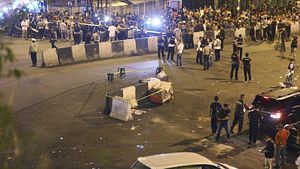On Wednesday evening, at around 9 p.m. local time, two explosions occurred near Jakarta’s Kampung Melayu bus terminal. Indonesian National Police deputy chief Comr. Gen. Syafruddin has confirmed that the explosions were likely due to two suicide bomb detonations and that there were six victims.
Three Jakarta police officers have been confirmed killed in the blasts. At least ten people, including civilians and other police officers, have been injured. Jakarta police have not attributed the attack to any specific group; as of this writing, no groups have claimed responsibility for the attack.
Wednesday’s incident is the first major terror incident to hit Jakarta since the January 14, 2016, attack carried out by Islamic State-linked attackers near the city’s Sarinah shopping center in the city center.
Wednesday’s attack, however, matches a more common trend in recent attacks in Indonesia that have targeted police officers and the state security apparatus more broadly. (The Sarinah attack also target a nearby police post.)
In February 2017, Indonesian police shot and killed an Islamic State-linked militant after he detonated a small bomb. In March 2017, gunmen sought to retaliate against the West Java Police headquarters, according to National Police Spokesperson Boy Rafli Amar.
In December 2016, Indonesian counterterrorism police killed three militants in a gunfight outside Jakarta; the attackers had planned to stab traffic police and detonate a bomb afterwards.
That tactic would have echoed a successful attack in October 2016, when an attacker carrying a machete injured three Indonesian police officers outside Jakarta. Indonesian authorities investigated the attacker for possible ties to the Islamic State in Iraq and Syria.
Indonesian authorities have been increasingly concerned in recent years that the influence of the Islamic State and other transnational terror groups is successfully encouraging homegrown attackers.
Indonesia, the world’s largest Muslim country, had struggled with Islamic extremism through the first decade of the 2000, with the Indonesian National Police setting up Special Detachment 88, the primary counter-terrorism force, after the Jemaah Islamiyah-orchestrated 2002 Bali bombing that killed 204.
Today, nearly 400 Indonesians — out of a country of 257 million — are estimated to be fighting for the Islamic State in Syria. Indonesian authorities worry about the influence of returnee Islamic State fighters, who could stage domestic attacks.
































